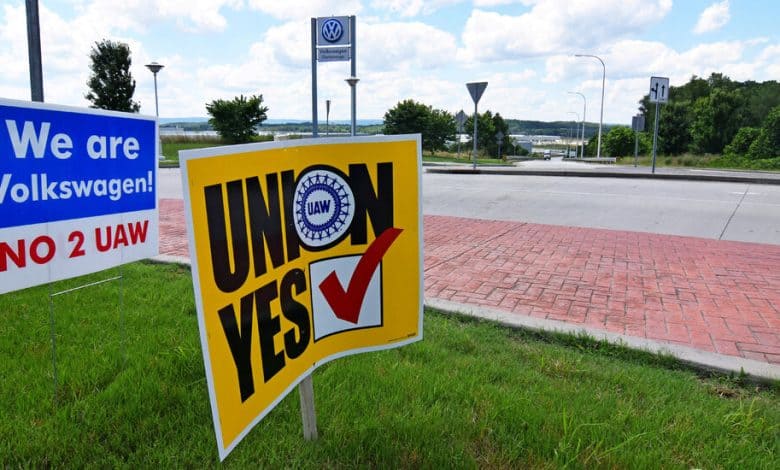A Union Vote at Volkswagen Is a Big Test for Organized Labor


A vote to unionize a Volkswagen plant in Tennessee would reflect the resurging might of organized labor in the U.S.Credit…Nick Carey/Reuters
Labor pains
After a “summer of strikes” last year that stretched from Detroit to Hollywood, unions are on a roll, flexing their growing might. Friday will bring a new test of that power as workers at a Volkswagen factory in Tennessee vote on whether to join the United Automobile Workers.
Victory there would mark perhaps the first time a foreign carmaker’s U.S. plant became unionized and form a beachhead for organized labor in the anti-union South. But it could also resonate well beyond the car industry as President Biden cultivates labor in battleground states like Michigan and Pennsylvania.
A yes vote would be a big win for the U.A.W. After securing big pay raises at the Big Three Detroit carmakers last year, the union is taking aim at the more than two dozen nonunion car factories in the U.S. (Those companies, including Toyota and Tesla, responded by raising wages for factory workers.)
The U.A.W. president, Shawn Fain, has pledged to spend $40 million over the next two years to help workers organize nonunionized manufacturers — whose factories are largely in nonlabor-friendly states. “Conditions are as favorable as they’ve been in my lifetime,” he told Automotive News recently.
Unions are having a moment after years of falling membership. From 1983 to 2023, the share of total U.S. workers in unions fell by 10 percent. But public support for unions is growing.
Efforts to organize workers at a broad range of companies, from Amazon to Starbucks, have taken on more prominence as well. Among the announcements just this week:
-
Workers at a Mercedes-Benz factory in Alabama will vote next month on whether to unionize;
-
Disney workers who perform as theme park characters have filed to vote on joining the Actors’ Equity Association;
-
And pharmacists at CVS stores are moving to unionize.
Biden is pitching hard to organized labor. He has opposed Nippon Steel’s $14 billion bid for U.S. Steel, after the Pennsylvania-based company’s workers opposed the deal — later winning the endorsement of theUnited Steelworkers.
